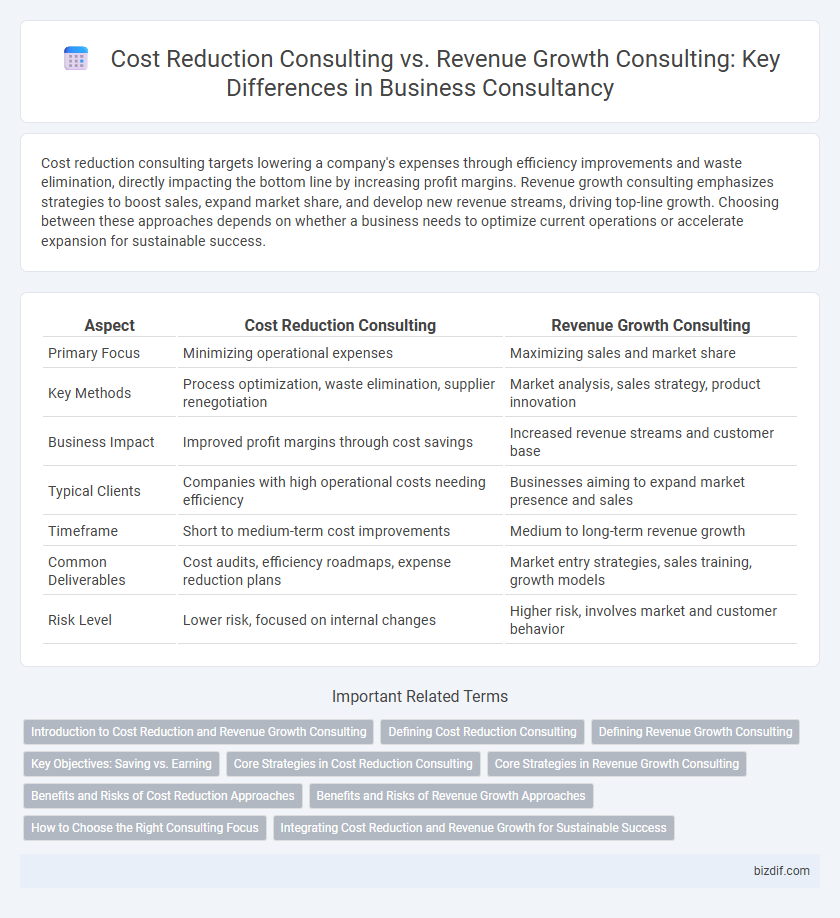Cost reduction consulting targets lowering a company's expenses through efficiency improvements and waste elimination, directly impacting the bottom line by increasing profit margins. Revenue growth consulting emphasizes strategies to boost sales, expand market share, and develop new revenue streams, driving top-line growth. Choosing between these approaches depends on whether a business needs to optimize current operations or accelerate expansion for sustainable success.
Table of Comparison
| Aspect | Cost Reduction Consulting | Revenue Growth Consulting |
|---|---|---|
| Primary Focus | Minimizing operational expenses | Maximizing sales and market share |
| Key Methods | Process optimization, waste elimination, supplier renegotiation | Market analysis, sales strategy, product innovation |
| Business Impact | Improved profit margins through cost savings | Increased revenue streams and customer base |
| Typical Clients | Companies with high operational costs needing efficiency | Businesses aiming to expand market presence and sales |
| Timeframe | Short to medium-term cost improvements | Medium to long-term revenue growth |
| Common Deliverables | Cost audits, efficiency roadmaps, expense reduction plans | Market entry strategies, sales training, growth models |
| Risk Level | Lower risk, focused on internal changes | Higher risk, involves market and customer behavior |
Introduction to Cost Reduction and Revenue Growth Consulting
Cost reduction consulting focuses on identifying inefficiencies and implementing strategies to lower operational expenses, thereby improving profitability. Revenue growth consulting emphasizes expanding sales channels, optimizing pricing strategies, and enhancing customer acquisition to increase overall business income. Both approaches are integral to strategic financial management, offering tailored solutions to enhance a company's economic performance.
Defining Cost Reduction Consulting
Cost reduction consulting focuses on identifying inefficiencies and implementing strategies to lower operational expenses without sacrificing quality or performance. It involves analyzing financial data, optimizing resource allocation, renegotiating supplier contracts, and streamlining processes to maximize cost savings. Effective cost reduction consulting enhances profit margins by reducing waste and improving budget management across various business functions.
Defining Revenue Growth Consulting
Revenue growth consulting centers on identifying and implementing strategies to expand a company's sales, enhance market share, and improve profit margins through targeted initiatives such as pricing optimization, market expansion, and salesforce effectiveness. Unlike cost reduction consulting, which focuses on minimizing expenses and operational inefficiencies, revenue growth consulting drives business scalability by exploring new revenue streams and maximizing existing customer value. Key metrics include increased top-line sales, customer acquisition rates, and improved average transaction values, making it essential for businesses targeting sustainable growth.
Key Objectives: Saving vs. Earning
Cost reduction consulting prioritizes identifying inefficiencies and streamlining operations to achieve significant savings and improve profitability. Revenue growth consulting focuses on expanding market share, optimizing sales strategies, and enhancing customer acquisition to maximize earnings. Businesses often require a balanced approach, leveraging cost-saving measures alongside revenue-generating initiatives to ensure sustainable financial health.
Core Strategies in Cost Reduction Consulting
Cost reduction consulting emphasizes core strategies such as process optimization, waste elimination, and supplier renegotiation to enhance operational efficiency and reduce expenses. Consultants analyze financial benchmarks and leverage technology integration to identify cost-saving opportunities without compromising product or service quality. This approach directly improves profit margins by systematically targeting overhead, labor, and material costs.
Core Strategies in Revenue Growth Consulting
Revenue Growth Consulting emphasizes core strategies such as market segmentation, customer acquisition, and pricing optimization to drive sustainable top-line improvements. Consultants analyze data-driven insights and competitive landscapes to identify high-potential growth opportunities and tailor strategic initiatives accordingly. Focusing on innovation, product development, and sales channel expansion further amplifies revenue streams and enhances long-term profitability.
Benefits and Risks of Cost Reduction Approaches
Cost reduction consulting delivers immediate financial relief by identifying inefficiencies and cutting unnecessary expenses, improving short-term profitability but potentially risking employee morale and operational capacity. This approach benefits companies seeking swift budget alignment but may lead to diminished innovation and customer satisfaction if overused. Balancing cost reduction with strategic growth initiatives prevents harm to long-term competitiveness while maintaining fiscal discipline.
Benefits and Risks of Revenue Growth Approaches
Revenue growth consulting focuses on strategies such as market expansion, product diversification, and pricing optimization to enhance a company's top-line performance, potentially leading to increased market share and higher profitability. Benefits include accelerated business scaling, improved customer acquisition, and stronger competitive positioning, while risks involve overinvestment in uncertain markets, possible dilution of brand value, and operational strain due to rapid growth demands. Effective revenue growth consulting requires thorough market analysis and risk management to balance aggressive expansion with sustainable business practices.
How to Choose the Right Consulting Focus
Choosing between cost reduction consulting and revenue growth consulting depends on a company's current financial priorities and long-term strategic goals. Cost reduction consulting targets improving operational efficiencies and cutting unnecessary expenses to enhance profitability, ideal for businesses facing tight margins. Revenue growth consulting concentrates on expanding market share, optimizing sales processes, and launching new products to increase top-line revenue, suitable for companies aiming to scale and capture new opportunities.
Integrating Cost Reduction and Revenue Growth for Sustainable Success
Integrating cost reduction consulting and revenue growth consulting creates a balanced strategy that enhances profitability while driving scalable business expansion. By leveraging data-driven cost optimization techniques alongside targeted revenue enhancement initiatives, companies achieve sustainable success and improved competitive advantage. This holistic approach aligns operational efficiency with market-driven growth, fostering long-term financial resilience.
Cost reduction consulting vs Revenue growth consulting Infographic

 bizdif.com
bizdif.com